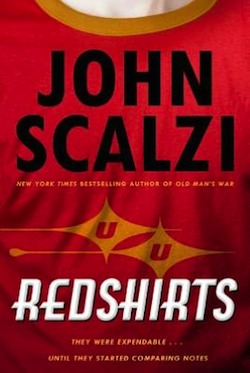 Ensigns Dahl, Duvall, Hester, Finn, and Hanson are ensigns that have been assigned to the Intrepid, the flagship of the Universal Union's spacefleet. They soon discover that things are very wrong onboard the ship. The Intrepid has a crew problem - specifically that it always needs more crew. It has a disturbingly high casualty rate for away missions - particularly missions involving specific key members of the crew. Because of this, the rest of the crew has developed a set of superstitious rules to keep themselves alive. The rules are ludicrous and in some cases are based on a subversion of the laws of science itself, but such complaints ignore the most important part: the rules actually work. Redshirts, the comedy scifi novel by John Scalzi is a parody, a criticism, and at times a celebration of Star Trek and bad scifi writing. More than simply hanging a lantern on all the flaws, inconsistencies, and lazy writing of the average scifi episode, Redshirts makes this the central concept of the story. Though the story starts with this unconventional setup, it doesn't rest there and try to dribble out a basic plot that goes no farther than this first idea. Finding out that there seem to be rules for survival is just the beginning, as our group of ensigns decides to find why this is happening, the meaning behind it, and just what they can do about it. And that's where Redshirts goes farther than a basic story. It doesn't just stop at a unique and comical setup - it heads down the rabbit hole to where such a proposition would lead the characters. This finds them deep in the land of metafiction and Star Trek tropes, displaced in both space and time from where both their and our expectations. It's a fun ride no matter where it leads. The writing is fun, crisp, and uncluttered. Characters are defined by their conversational exchanges more than a list of descriptions. The book doesn't waste time telling you to empathize with a character, instead the character talks and acts, giving you much better reasons to know and like them. The writing never seems laborious and instead possesses a one-more-chapter quality that will keep you up late into the night. The central theme of Redshirts is repeated in the three part coda included after the end of the novel. It doubles down on the ideas of tropes, clichés, and the scifi we've all seen before It points out not just that such a repetition of old ideas shows up again and again, but also questions why it should be reoccurring. What's gained by trope repetition and lazy writing? Is it standing in the way of truly interesting scifi plots? Or do we all secretly think we're writing for an audience who wants to see the same thing over and over again? To sum up Redshirts, I'm going to go back to an idiom a friend of mine repeated so many years ago. When describing the latest Star Trek movie and also later when talking about other scifi works, he used this phrase: "It had plot holes that you could pilot a starship through." This novel is doing that very thing: Redshirts is piloting a starship right through the plot holes in the genre... at warp speed. John Scalzi's site Get Redshirts on Amazon
0 Comments
Leave a Reply. |
Archives
December 2022
|
 RSS Feed
RSS Feed
